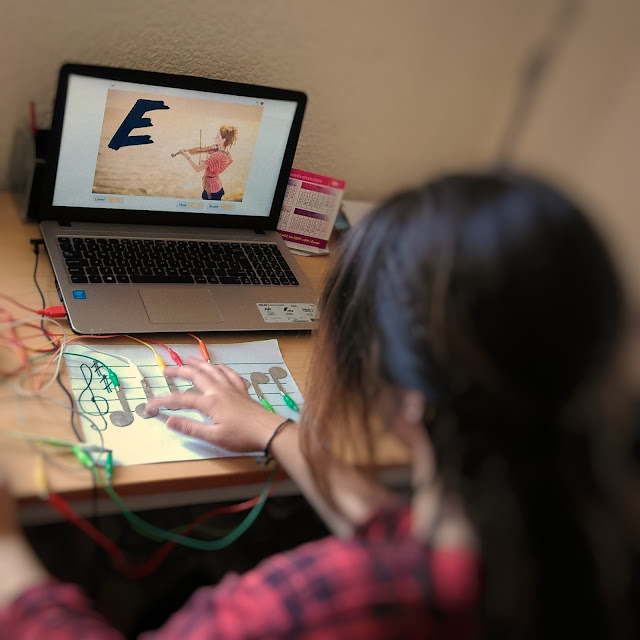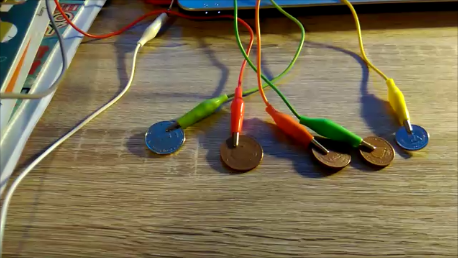Round two
The general consensus from my students this week
was that visually they liked the game a lot more, but that the new level was
too difficult.
When some of them said they would like a level in
the game where they had to recognise the notes by ear I was surprised. In
lessons we sometimes play games like 'copy and paste' where I play something
and they have to play it back without me telling them what the notes are, and
with some students I have spent some time helping them to work out favourite
songs by ear but it has never been particularly successful and if I am honest
I've neglected to cover it in lessons over the last few months. We sometimes do
singing of intervals so they learn to hear in their heads the note they are
about to play, but mostly we have focused on major and minor thirds and perfect
fifths so we have not covered all the intervals of the major scale.
Despite these reservations, I decided to make this
level because it sounded like a fun challenge. I asked a music teacher friend
to try it out before I used it with my students and confirmed my thoughts - she
said that she thought it was much more fun than the previous version of the
game but she wondered would it be too hard for some students?
Before they started playing the game I explained to
each student what the new level entailed and told them not to rush to answer
the questions but to try to sing up the scale to work out which note it was or
at least try to hear if the note they are looking for is higher or lower than
the previous note so that they were in with a good chance of a correct guess!
They all found it difficult, some more than others
but most of them were very frustrated by not being able to recognise the notes.
The sense of flow which had been present when they played the first version of
the game was no longer there because the level of challenge was too high for
them.[1] Andrew Brown recommends
that educators involve students in the setting of challenges and goals to keep
them motivated and engaged in the activities.[2] I did this – the idea for
this level came from the students themselves but perhaps I should have gone
with my initial thoughts, and the thoughts of my colleague and suggested we try
something easier and more inline with their abilities for this second level.
When I saw them get frustrated I tried to help them
by singing up the scale to the note they were supposed to be recognising
because I realised that they were not able to hold the key note in their heads
to return to it each time when working out intervals.
Talking with my students after they had played,
most of them still wanted this level to be part of the game, but felt that I
needed to make another level to go in between so that the jump in difficulty was
not as big. One student made a great suggestion which I have already put into
the game so it is ready for them to try next week. She suggested that level 2
questions should always start with D - the key note and then another note which
they must recognise by ear. This way it will be easier for them to work out the
unknown note because they can sing up the scale from the key note.
So my game now has three levels. Although most students
said they thought the length of the game was just right I have now made it
longer to give people the chance to play all three levels. Because two notes
are played for each question in level two this takes up more time and so the
number of questions you can answer in the time-frame has decreased. I'm looking forward to trying the game again next week and I hope the sense of flow will return!
Here is a short video of the new middle level:
And here is the game:
In other news, the student who had the most
problems with reading music did amazingly well this week. I let her play the first
version of the game again, without the challenging level 2 and she got a score
of 37 without making any mistakes which is a big improvement on her previous
average of 23 with several mistakes! She was very happy with herself and I am
happy that I have seen her improve her note reading skills through playing this
game.
Brown, Andrew R. Music Technology and Education [Electronic
Resource]: Amplifying Musicality. Second edition. New York, New York:
Routledge, 2015.
Burnard, Edited By John Finney And
Pamela. Music Education with Digital Technology. Bloomsbury UK. Accessed
May 19, 2017. https://www.dawsonera.com/abstract/9781441186539.
[1] Burnard, Music Education with Digital
Technology, 45.
[2] Brown, Music Technology and Education
[Electronic Resource], 23.



Comments
Post a Comment